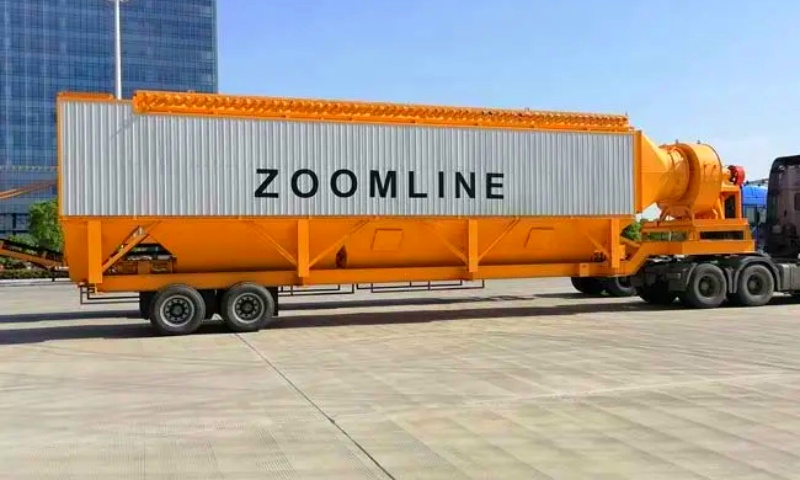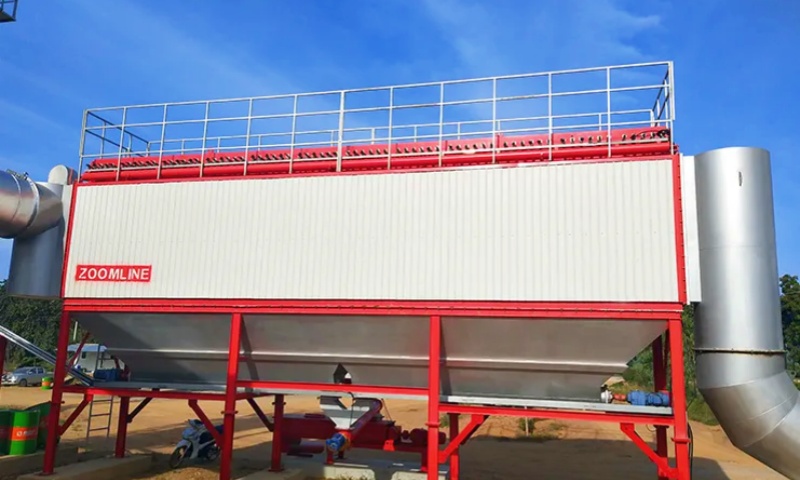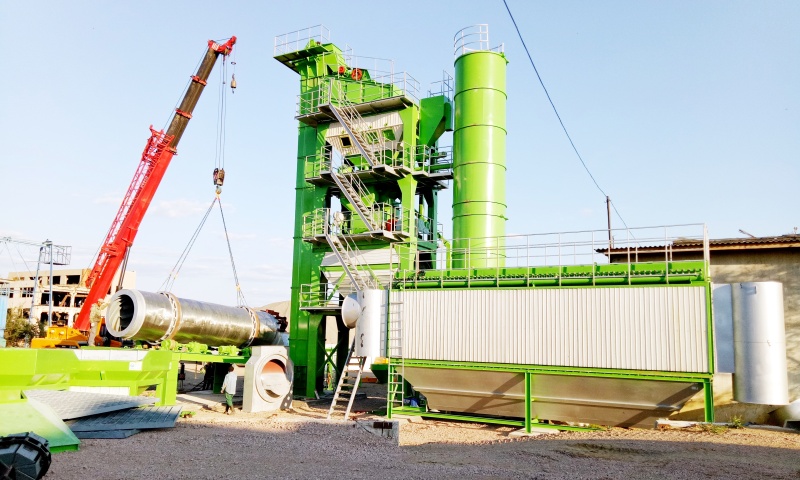During the production process in asphalt mixing plants, dust and particulate emissions are an unavoidable issue. These emissions not only severely impact surrounding air quality but may also expose businesses to the risk of violating environmental regulations. To address this challenge, various dust collection systems have emerged, and bag filters, with their outstanding performance, have gradually become an indispensable key piece of equipment in asphalt mixing plants. This article will delve into the primary advantages of bag filters in asphalt mixing plants, analyzing their benefits across multiple aspects, including emissions control, operational efficiency, and improvements in product quality.
A bag filter, also commonly referred to as a fabric filter or fabric dust collector, is a device used to control air pollution. Its primary function is to collect dust and remove particulate matter or gases that may be released during industrial production processes from the air. In asphalt mixing plants, bag filters are widely used to control the emission of air pollutants. After dust particles are filtered through the filter bags, clean air is released, while impurities are retained within the filter bags. Additionally, the filter bags can be removed and replaced to ensure the continuous, efficient operation of the equipment.

The operational process of a bag filter in an asphalt mixing plant primarily involves three closely interconnected stages.
First is the dust collection stage. During the production process at an asphalt mixing plant, operations such as crushing, screening, and mixing generate large amounts of dust-laden air. These airflows, carrying pollutants such as mineral powder and asphalt fumes, enter the bag filter at a specific velocity and are precisely directed by deflector plates to the filter bag area. As the air passes through the filter bags made of high-performance fiber materials, dust particles of various sizes are efficiently trapped on the outer surface of the filter bags through multiple dust removal mechanisms, including sieving, inertial collision, diffusion interception, and electrostatic adsorption. The clean air, after undergoing multiple layers of filtration, is discharged through the outlet at the top and released into the atmosphere after meeting environmental standards. It is worth noting that the selection of filter bag material is critical. For example, using PTFE-coated filter media not only improves filtration efficiency but also enhances the ability to intercept fine dust, ensuring effective dust removal.
Next is the cleaning process. As dust removal operations continue, dust accumulates on the surface of the filter bags, forming a dust layer. If not cleaned promptly, this will increase filtration resistance and reduce dust removal efficiency. To maintain the long-term effectiveness of the filter, it is necessary to regularly remove the accumulated dust from the filter bags. Currently, common cleaning methods include pulse jet cleaning, reverse airflow cleaning, or mechanical vibration cleaning. In asphalt mixing plants, the most commonly used method is pulse jet cleaning. This method relies on an advanced control system to instantly inject short pulses of compressed air (typically at a pressure of 0.4–0.6 MPa) into the filter bags, causing them to undergo rapid expansion and contraction deformation. This intense shaking breaks the adhesive force between the dust layer and the filter bags, causing the dust to quickly detach and then fall into the collection hopper below under the influence of gravity. The time interval and intensity of the pulse jet cleaning can be precisely adjusted according to actual operating conditions, ensuring both cleaning effectiveness and extended filter bag lifespan.
Finally, the dust handling process involves storing the collected dust in a hopper. This dust is not worthless waste. The mineral powder components can be reintroduced into asphalt mixtures after scientific processing by strict environmental regulations and quality standards, achieving resource recycling. This not only reduces production costs but also minimizes solid waste emissions. For dust containing pollutants such as asphalt fumes, specialized treatment equipment is used to undergo processes like heating, adsorption, and catalytic combustion for harmless treatment, ensuring that the final emissions meet national environmental protection requirements and achieving green production.
Filter bags made from composite needle-punched felt or nano-coated filter media can target and capture dust particles as small as 0.1 microns, achieving a filtration efficiency exceeding 99.9%. Taking a certain million-ton-scale asphalt mixing plant in North China as an example, after installing a bag filter, the dust concentration in exhaust gas dropped sharply from 300 mg/m³ to 8 mg/m³, far exceeding emission standards, thereby establishing a robust environmental compliance barrier for the company’s production operations.
Compared to traditional equipment such as electrostatic precipitators and cyclone separators, bag filters reduce initial investment costs by 20%-30% and space requirements by 15%. Their modular design reduces filter bag replacement time to within 2 hours, lowering annual maintenance costs by 40%. The intelligent pulse cleaning system works in tandem with low-energy fans, achieving an average daily energy savings of 12%, leading to cost advantages throughout the entire lifecycle.
Ultra-low Emissions for Environmental Protection
Pulse jet cleaning technology is deeply integrated with gradient filtration materials, ensuring that dust emission concentrations are consistently controlled below 15 mg/m³. In an application case at a suburban mixing plant in the Yangtze River Delta region, PM2.5 and PM10 concentrations in the surrounding area decreased by 21% and 19%, respectively, significantly improving air quality within and around the plant and effectively alleviating the NIMBY effect.

The filter bags are coated with an anti-static layer and treated with PTFE for water and oil resistance, combined with an intelligent dust removal frequency control system. Under continuous operation conditions of 16 hours per day, the service life can reach 28–36 months. Actual data from a western mixing plant shows that after 28 months of continuous use, the filtration efficiency remains above 99.2%, significantly reducing downtime losses.
For the complex operating conditions of asphalt mixing plants, such as high temperatures of 260°C, high humidity, and asphalt fumes, customized high-temperature-resistant filter bags made of aramid or PTFE-coated filter bags can be provided. Through modular combination design, the system can flexibly adapt to different production capacity requirements. For example, a large pulse system customized for a 200 t/h production capacity mixing plant can handle an airflow of up to 120,000 m³/h, achieving a balance between production capacity and environmental protection.
In summary, the use of a bag filter in asphalt mixing plants provides an efficient, economical, and environmentally friendly solution for dust collection and emission control.
Filter bags or cartridges are the primary components of many filtration systems, such as a bag filter. These components are made from specialized fabric materials capable of capturing particulate matter from the airflow. Material selection is critical, as it must withstand the high temperatures and chemical corrosion common in asphalt production environments. Regular maintenance and replacement of filter bags ensure sustained filtration efficiency and compliance with emission standards. Consulting with asphalt mixing plant suppliers for professional advice when selecting appropriate filter bags can be highly beneficial.
Fan and blower systems are responsible for pushing air through the filtration system. These components generate the necessary airflow to move exhaust gases through the filtration media. High-performance fans and blowers are critical for maintaining optimal air pressure and flow to ensure the filtration system can handle the required load. Proper maintenance of these systems is key to avoiding inefficiency and potential system failures.
Dust collection devices are an important component for capturing and storing particles separated by the filtration medium. These devices collect dust and debris removed from exhaust gases for disposal or recycling. The design and efficiency of dust collection devices impact the overall performance of the filtration system, so selecting devices that match the specific requirements of the facility is critical. Asphalt mixing plant suppliers can provide customized solutions based on specific business needs.
In asphalt pavement construction, the quality of the mix directly determines the pavement’s strength, durability, and service life. As a critical piece of equipment in the asphalt production process, bag filters provide a vital safeguard for the production of high-quality asphalt mix through precise filtration mechanisms.
The raw materials used in asphalt mixture production are complex and diverse, inevitably containing impurities and particles. If these impurities are not treated, they will directly affect the uniformity and stability of the mixture. bag filter, with its specialized filtration materials and structure, effectively intercepts various impurities in raw materials. Their filter bags are made of high-precision filtration materials with uniformly distributed pores, accurately capturing pollutants ranging from microscopic particles to larger impurities. As raw materials flow through the filter, impurities are firmly adsorbed onto the filter bag surface, while pure raw materials pass through smoothly. This reduces impurity interference with mixture quality from the source, providing clean raw materials for subsequent mixing processes.
In asphalt mixture production, temperature control is critical. Unstable temperatures can cause changes in asphalt viscosity, thereby affecting the mixing effect of the mixture. The bag filter indirectly stabilizes temperature during operation. Its rational structural design reduces heat loss of raw materials during the filtration process, keeping raw materials within an appropriate temperature range. Additionally, the high-efficiency filtration of the filter bags reduces equipment malfunctions caused by impurity blockages, preventing localized overheating or temperature drops. This creates favorable conditions for mixing asphalt mixtures in a stable temperature environment, ensuring mixing quality.
The efficient operation of the bag filter also improves the production efficiency of asphalt mixtures, indirectly enhancing quality. Traditional filtration equipment has low filtration efficiency, is prone to blockage, and requires frequent shutdowns for cleaning, which not only affects production progress but also causes quality fluctuations due to repeated processing of raw materials. In contrast, bag filters have a large filtration area and good dust-holding capacity, enabling long-term stable operation, reducing shutdown frequency, ensuring continuous and stable raw material processing, avoiding quality inconsistencies in the mixture caused by production interruptions, and making the production process easier to control, thereby improving the overall quality of the mixture.
Additionally, the ease of maintenance of the bag filter supports the stability of the asphalt mixture quality. Filter bag replacement is simple and quick, completing in a short time and minimizing the impact of equipment maintenance on production. Furthermore, regular filter bag replacement ensures the filter maintains high-efficiency performance, preventing raw material contamination caused by reduced filtration effectiveness, and providing a reliable guarantee for the long-term stable production of high-quality asphalt mixtures.
In summary, bag filters enhance asphalt mixture quality from multiple aspects by precisely intercepting impurities, stabilizing raw material temperature, improving production efficiency, and offering convenient maintenance. As demands for asphalt pavement construction quality continue to rise, bag filters have undoubtedly become essential equipment for ensuring asphalt mixture quality, laying a solid foundation for constructing durable and stable asphalt pavements.

Typically, wet scrubber systems include gravity dust collectors and cyclone dust collectors, with some systems using only a large cyclone dust collector and a wet scrubber. Dusty airflow enters the gravity dust collector for primary filtration, then proceeds to the cyclone dust collector for secondary filtration, and finally enters the water tank. In this system, even after two to three stages of dust removal, the dust removal efficiency can only reach 92%–94.5%, with significant dust emissions that fail to meet current environmental protection requirements.
In contrast, a bag filter system consists of a gravity dust collector and a bag filter, achieving an efficiency of 99%. Dust-laden airflow enters the gravity dust collector for filtration after exiting the drying drum, then proceeds to the bag filter. The collected dust can be reused or centrally emitted and processed through dust treatment equipment, such as being transported to brick factories, to fully utilize the recycled dust and reduce environmental pollution.
In summary, wet scrubbers are inefficient and cannot meet modern environmental protection requirements, while bag filter systems not only comply with regulatory standards but also enable sustainable dust management. For forward-thinking asphalt mixing plants, they are undoubtedly the superior choice.
Selecting the ideal bag filter system for your facility depends on several key factors, including dust type, particle size distribution, airflow requirements (CFM), operating temperature, and plant layout. Consider the following selection criteria to ensure the best dust collector is configured for your production process:
Materials such as wood, metal, chemical powders, or combustible dust will significantly influence which bag filter design (vibration-type, reverse-air-type, pulse-jet-type) and filter media are most effective.
The correct ratio of filter area to air volume ensures appropriate capture efficiency and prevents filter overload, thereby maximizing system lifespan.
Maintenance and downtime: Pulse-jet and reverse-air bag filters enable continuous cleaning, minimizing disruption to the production process, while vibrating dust collectors may require more frequent downtime for cleaning.
Ensure your bag filter complies with OSHA, NFPA, and EPA standards for dust emissions, worker safety, and explosion protection—critical for handling combustible dust.
Many bag filters can be retrofitted with HEPA after-filters, spark arrestors, or energy-efficient VFD automation devices to enhance system flexibility and performance.
In summary, bag filters offer numerous significant advantages in asphalt mixing plants, including efficient capture of particulate matter, long-term cost-effectiveness, low emissions levels that support environmental sustainability, versatility to meet custom requirements, and improved asphalt mixture quality. For asphalt mixing plants seeking to balance compliance, operational efficiency, and sustainability, a bag filter is an indispensable investment.